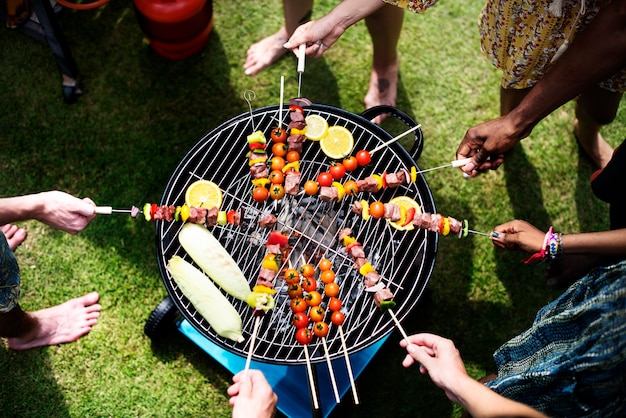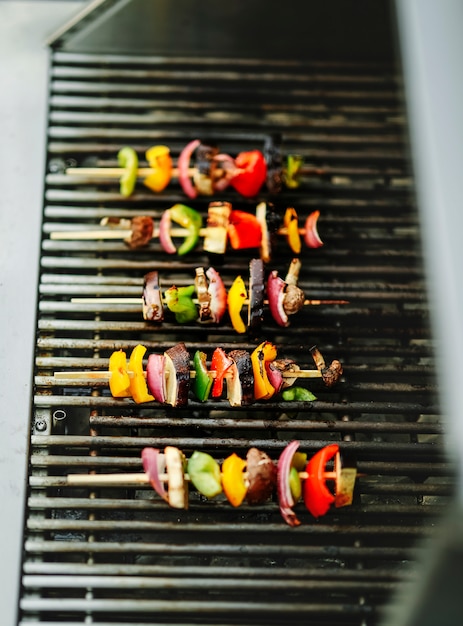Are disposable BBQs bad for the environment?
Disposable barbecues have become a popular choice for outdoor cooking and picnics, especially in the UK where the summer season often calls for gatherings and meals enjoyed in the sunshine. However, concerns have been raised regarding their impact on the environment. In this article, we will explore whether disposable BBQs are indeed bad for the environment and what alternative options are available for conscious consumers.
The rise of disposable BBQs
Disposable barbecues gained popularity due to their convenience and affordability. They are readily available in supermarkets, local stores, and even at petrol stations, making them a convenient option for spontaneous outdoor grilling. These single-use BBQs typically consist of a foil tray filled with charcoal and are designed to be easily disposed of after use.
The environmental impact
While disposable BBQs offer convenience, their environmental impact is a cause for concern. One of the main issues is the high amount of waste they generate. According to research, approximately 200 million disposable BBQs are used in the UK every year, resulting in a significant amount of waste that is often not properly disposed of or recycled.
“Approximately 200 million disposable BBQs are used in the UK every year.”
The materials used in disposable BBQs, such as aluminum and single-use plastic, also contribute to environmental degradation. Aluminum production requires significant energy and contributes to greenhouse gas emissions, while plastic waste can end up polluting our oceans and harming wildlife.
Alternatives to disposable BBQs
Thankfully, there are alternative options available that are more environmentally friendly. One popular choice is investing in a reusable and portable BBQ. These BBQs are often made from stainless steel or other durable materials and can be used multiple times, reducing waste and the need for constant repurchasing.
Another alternative is to use natural charcoal instead of the charcoal provided in disposable BBQs. Natural charcoal is typically made from sustainable sources, such as hardwood, and burns cleaner with fewer emissions. It is also worth considering electric or gas-powered BBQs, which have a lower environmental impact compared to disposable versions.
Considerations for responsible BBQing
To further minimize the environmental impact, it is important to adopt responsible BBQing practices. This includes properly disposing of waste, ensuring that any leftover charcoal is completely extinguished before disposal, and opting for locally sourced food products to reduce carbon emissions associated with transportation.
“Adopt responsible BBQing practices to minimize the environmental impact.”
Additionally, encouraging others to make environmentally conscious choices and raising awareness about the impact of disposable BBQs can help promote a more sustainable approach to outdoor cooking.
In conclusion
Disposable BBQs do have a negative impact on the environment due to the waste they generate and the materials used in their production. However, by opting for reusable BBQs, natural charcoal, and responsible BBQing practices, we can minimize the environmental harm caused by outdoor grilling. It is up to us as consumers to make informed choices and prioritize sustainability when enjoying our outdoor gatherings and delicious BBQ meals.
Do Disposable BBQs Give Off Carbon Monoxide?
Disposable barbecues are a popular choice for picnics, camping trips, and outdoor gatherings in the UK. They provide a convenient way to enjoy delicious grilled food without the need for bulky equipment or extensive preparation. However, one concern that often arises is whether disposable BBQs emit carbon monoxide (CO), a toxic gas that can be harmful to humans.
The good news is that when used correctly, disposable BBQs do not give off significant amounts of carbon monoxide. These portable grills are designed with ventilation holes that allow for proper airflow, preventing the buildup of CO. However, it’s essential to take certain precautions to ensure your safety.
Proper Usage Guidelines
“Always use disposable BBQs in well-ventilated areas, such as open spaces or outdoors, to minimize any potential risks.”
Here are some guidelines to follow when using a disposable BBQ:
- Choose a safe location away from flammable materials and structures.
- Place the barbecue on a stable, heat-resistant surface.
- Follow the manufacturer’s instructions on lighting the BBQ.
- Avoid using liquid accelerants, such as lighter fluid, as they can increase CO emissions.
- Do not use the BBQ indoors or in enclosed spaces like tents, cars, or garages.
- Ensure proper disposal of the BBQ after use, following local regulations.
Carbon Monoxide Safety
While disposable BBQs may emit small amounts of CO, taking these precautions significantly reduces the risk of exposure. However, it’s still important to be aware of the potential dangers and symptoms of carbon monoxide poisoning.
- Headaches
- Dizziness
- Nausea
- Confusion
- Shortness of breath
- Loss of consciousness (in severe cases)
If you or someone around you experiences these symptoms while using a disposable BBQ, it’s crucial to seek fresh air immediately, as CO poisoning can be life-threatening.
In conclusion, when used correctly and in well-ventilated areas, disposable BBQs do not pose a significant risk of emitting dangerous levels of carbon monoxide. By following the guidelines and being vigilant about safety, you can enjoy your outdoor grilling experience without worry.
Are Disposable BBQs Bad?
Disposable barbecues have become a popular choice for outdoor cooking, especially in the UK where the weather is unpredictable. They offer convenience, portability, and are budget-friendly. However, there are concerns about their environmental impact and safety.
Environmental Impact
Disposable BBQs are typically made of aluminum and contain charcoal briquettes. While aluminum is recyclable, many disposable BBQs end up in landfills due to improper disposal. This contributes to waste and harm to the environment.
The use of charcoal briquettes also raises environmental concerns. The production of charcoal involves cutting down trees and emitting harmful greenhouse gases.
According to a study by The Carbon Trust, using a disposable BBQ for cooking four burgers has a carbon footprint equivalent to driving a car for 37 miles.
Safety Concerns
Disposable BBQs can pose safety risks if not handled properly. Their lightweight design makes them prone to accidentally tipping over, which can cause burns or start fires. It’s important to place them on a stable surface away from flammable materials.
The high heat generated by disposable BBQs can also damage the ground or surfaces they are placed on, leading to potential hazards.
Alternatives
If you are concerned about the environmental impact and safety issues associated with disposable BBQs, there are alternative options available:
- Invest in a reusable portable BBQ that is made from sustainable materials.
- Consider using eco-friendly charcoal alternatives such as coconut husk briquettes or lumpwood charcoal.
- Opt for cooking methods like gas grills or electric grills, which have lower environmental footprints and additional safety features.
“By choosing greener alternatives and properly disposing of BBQ waste, we can minimize the negative impact on the environment while still enjoying outdoor cooking.”
Ultimately, the choice whether or not to use disposable BBQs depends on individual preferences and circumstances. However, it is essential to be aware of their potential drawbacks and explore more sustainable options for a greener future.
Are Disposable BBQs Safe?
Disposable barbecues have become increasingly popular in the UK for outdoor cooking, especially during summertime. These portable and convenient grills can be a great choice for picnics, camping trips, and small gatherings. However, there are concerns about the safety and environmental impact of disposable BBQs.
Safety Concerns
While disposable BBQs are generally safe to use, there are some important precautions to keep in mind. First, it’s crucial to follow the manufacturer’s instructions for properly lighting and extinguishing the grill. Using too much lighter fluid or failing to fully extinguish the coals can pose a fire risk.
Another safety consideration is the potential for burns. The metal base of a disposable BBQ can become extremely hot during use, so it’s important to place it on a sturdy, heat-resistant surface and keep it away from flammable materials.
Quote: “Always ensure you have a suitable fire extinguisher or water source nearby when using a disposable BBQ.” – Fire Safety Expert
Environmental Impact
The widespread use of disposable BBQs has raised concerns about their impact on the environment. Many disposable grills are not easily recyclable due to the mixture of materials used in their construction, such as aluminum, cardboard, and plastic.
When improperly disposed of, these BBQs can end up in landfills where they take a significant amount of time to break down. The carbon emissions produced during the manufacturing process and burning of charcoal briquettes also contribute to air pollution and climate change.
Tips for Safer and More Sustainable BBQs
- Consider investing in a reusable portable grill, which can be more environmentally friendly in the long run.
- If using a disposable BBQ, place it on a non-flammable surface and avoid setting up near dry grass or vegetation.
- Ensure the grill is fully extinguished and cooled before disposing of it in a designated waste bin.
- Choose natural charcoal briquettes or lumpwood made from sustainably sourced wood instead of those containing additives.
- Support local producers and opt for locally sourced, organic meats and vegetables to reduce the carbon footprint associated with food transportation.
In conclusion, while disposable BBQs can be convenient for outdoor cooking, it’s important to use them safely and responsibly. By following the manufacturer’s instructions, taking precautions against fire risks, and considering more sustainable alternatives, you can enjoy a safe and environmentally friendly barbecue experience.
Are disposable BBQs being banned?
Disposable BBQs have long been a popular choice for outdoor cooking, particularly in the UK where summer barbecues are a cherished tradition. However, there is growing concern over their environmental impact, leading to calls for their banning or increased regulation.
The Environmental Impact
Disposable BBQs are typically made from aluminum and contain charcoal briquettes. While they may seem convenient, they pose significant environmental hazards. Firstly, their production contributes to deforestation and greenhouse gas emissions. Secondly, their disposal presents problems as aluminum can take hundreds of years to break down, and the charcoal residue can harm soil and waterways.
According to a recent study, it is estimated that over 100 million disposable BBQs are used every year in the UK alone, leading to a substantial amount of waste and pollution. This has prompted concerns about their impact on wildlife, air quality, and climate change.
The Call for Ban or Increased Regulation
Many environmental organizations and local authorities are pushing for a ban on disposable BBQs or stricter regulations on their use. They argue that encouraging reusable and more sustainable alternatives, such as portable grills or picnic sets, can help reduce waste and protect the environment.
“Disposable BBQs may seem convenient, but their environmental impact cannot be ignored. We need to find alternative solutions that allow people to enjoy outdoor cooking without compromising our planet’s health” – Green Campaign UK
Alternative Solutions
As disposable BBQs come under scrutiny, several alternatives are gaining popularity. Reusable BBQs made from stainless steel or cast iron are durable and often foldable, making them easy to transport and store. These options can help reduce waste and also provide better heat distribution for more efficient cooking.
Another popular solution is the use of communal BBQ areas, which are becoming increasingly common in parks and public spaces. These areas often have fixed grills that can be used by multiple individuals or groups, reducing the need for disposable BBQs.
The Future
While there is no immediate ban on disposable BBQs, the discussion surrounding their environmental impact continues. It is important for individuals to consider the long-term consequences of their choices and explore more sustainable options when it comes to outdoor cooking.
By adopting eco-friendly alternatives, such as reusable grills or using communal BBQ areas, individuals can still enjoy their favorite BBQ meals without contributing to excessive waste and pollution.



